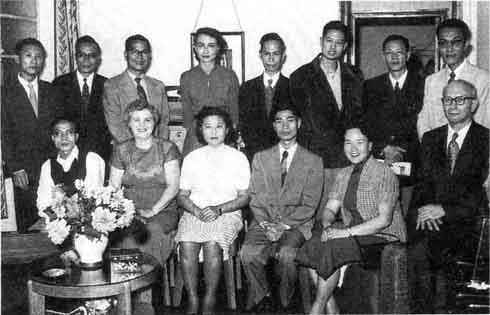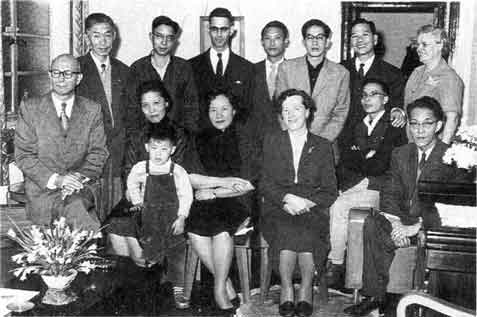
|
Macau Bahá'í Community in the Early Years
by Barbara R. Sims
 |
chapter 3 | start page | single page | chapter 5 |  |
Chapter 4
In October 1954 the second Macanese, Mr. Paul Kao declared.
One day in August 1954 Mrs. Heller was fishing at the breakwater and a young man, a foreigner, came by and asked her if she would teach him English. He was Mr. Manuel Ferreira, a Portuguese. Mrs. Heller had him read the English edition of "Bahá'u'lláh and the New Era" side by side with the Portuguese edition. In that way he studied English and also learned about the Faith. He declared his belief in Bahá'u'lláh October 25, 1954, the first Portuguese to become a Bahá'í in Macau.
Mrs. Heller left Macau to return to the United States November 4, 1954.
Gradually the number of declarations increased. The first enrollments were as follows:
- Mr. Harry Yim enrolled in July 15, 1954 but it was approved September
30, 1954.
- Mr. Paul Kao, enrolled in October 1954. He resigned from the Faith in
April 1957 as he was teaching in a Catholic school.
- Mr. Manuel Ferreira, the first Portuguese to enroll, October 25,
approved November 8, 1954. He left Macau to return to Portugal in 1958. Mrs.
Heller kept in touch with him for several years.
- Mr. William Yang, (Yang Wu-hu), enrolled December 1954, approved January
21, 1955.
- Miss Mary Tung (Mrs. Shia), enrolled January 26, 1955, transferred to
Hong Kong in February 1956.
- Mr. Paul Hsia (Shia), enrolled April 23, 1955, transferred to Hong Kong
in February 1956.
- Mr. John Chang, (Cheong Siu Choi or Chang Shao-tsai), enrolled May 23,
1955.
- Mr. Joaquim Canhita, who was in the Portuguese army, enrolled April 29,
1956.
- Mr. Julio da Conceicao Mata, from Portugal, enrolled October 28, 1956
and left before 1961.
- Mr. William Jasai, a Portuguese serving with the Army, enrolled April
13. 1958, and left Macau the same month for Africa.
- Mr. Suen Shiu Kei, enrolled June 29, 1958.
- Mr. Jimmie Yuen, enrolled July 29, 1958, and transferred to Hong Kong in
1960.
- Mr. Peter Chow, enrolled July 27, 1958.
- Mr. Domingo Tertuliano Cordeiro Vilas, a corporal in the Portuguese army
enrolled on February 15, 1959.
- Mr. Wu Tze-ming enrolled March 15, 1959.
- Mrs. Margaret Chang, (Chang Jui-chun), Mr. John Chang's wife, enrolled
June 8, 1959.
- Mrs. Pansi Yim (Yim Pan Sih or Yim Poon Si), Mr. Yim's mother, became a
Bahá'í in December 1959.
- Mrs. L.H. Koo, (Kno Ch'uan Leng-tsao) (Koo Lang-ngo), enrolled January
24, 1960. Mrs. Koo was Jimmie Yuen's aunt.
- Mrs. M.T. Lee Yip, (Yeh Li Mei-t'ao), enrolled February 5, 1960.
- Mr. Liu Ch'i Ming, declared February 21, 1960.
- Mr. Yeh Wei-min, (Wai Mung Yip), declared September 30, 1961. Mr. Yeh
was the only declared believer in 1961.
- Mr. Long Kan Yit, declared March 2, 1962.
- Mr. John Yeung, enrolled March 2, 1962.
- Mr. Liang Chien-yeh enrolled March 1, 1962.
- Mr. Wang Yan Chung, a youth, enrolled March 21, 1964.
- Mr. Wang Yan Cheng, a youth, enrolled March 21, 1964.
- Mr. Cheong Fun Wai, a youth, enrolled March 21, 1964.
- Mr. Choi Hing Wun, a youth, enrolled March 21, 1964.
- Mr. Yim Chee Sing, a youth, enrolled March 21, 1964.
- Miss Wai Yin-tam lived in Macau but became a Bahá'í in Hong Kong in March 1964.
Administratively, Macau was under the National Spiritual Assembly of the United States and as people declared their belief in Bahá'u'lláh, their enrollment cards were sent to the Asia Teaching Committee of the National Spiritual Assembly of the United States for approval.
Often the enrollment date was a month or so previous to the approval date by the Asia Teaching Committee. Sometimes the actual enrollment date was not registered.
After the National Spiritual Assembly of North East Asia was elected (1957) all the declaration cards were sent to that administrative body.
None of the Macau believers was native born, and some apparently left the country soon after declaring their belief in Bahá'u'lláh. A large portion of the inhabitants of Macau was quite transient as Macau was considered a stepping stone to somewhere else. Enrollments increased but so did exits from the country.
Four Naw-Rúz Celebrations
 click for larger image |
A Naw-Rúz celebration on March 20, 1955 at 8 PM. There were twelve visitors and six Bahá'ís present in all. In this photograph, seated: Mr. Paul Kao, Mrs. Scherer, Miss Mary Tung (Shia), Mr. Wu, Mrs. Liu and Mr. Scherer. Standing: Mr. William Yang, Mr. Chu, Mr. Yim, Mrs. Chu, Mr. Wong, Mr. Wong, Mr. Tsang, and Dr. Liu.

click for larger image
A Naw-Rúz celebration, March 21, 1956 at Mr. Scherer's residence. Seated: Mr. Scherer, Mrs. Chang, the Changs' son, Mrs. Liu, Miss D.M. Maclean (Vice British Consul to Macau), Mr. Paul Kao and Dr. Liu. Standing. Mr. John Chang, Mr. K.M. Wong, Mr. Anfang, Mr. William Yang, Mr. Min, Mr. Yim and Mrs. Scherer. There were eight guests and six Bahá'ís.

click for larger image
Naw-Rúz 1959 at Mr. John Chang's residence. Eleven guests and eight Bahá'ís were present. Seated: Mr. Domingos Vilas, Mr. John Chang, the Chang's son, Mrs. Margaret Chang, Mrs. Pansi Yim, Mrs. Liu, Dr. Liu, and Mr. Joaquim Canhita. Standing: Mr. Ng, Mr. Amaral, Mr. Julio Mata, Mr. Jimmie Yuen, Mr. Chong, Mr. T.M. Wu, Mr. Yip, Mr. Harry Yim, Mr. Peter Chow, Dr. Lau and Mr. Liu. By this time there were no American pioneers in Macau but there were still several Bahá'ís attached to the Portuguese Army. Eventually they all left as their tour of duty finished.

Naw-Rúz celebration, 1960, held at Tao Tao Chu.
 |
chapter 3 | start page | single page | chapter 5 |  |
|
|